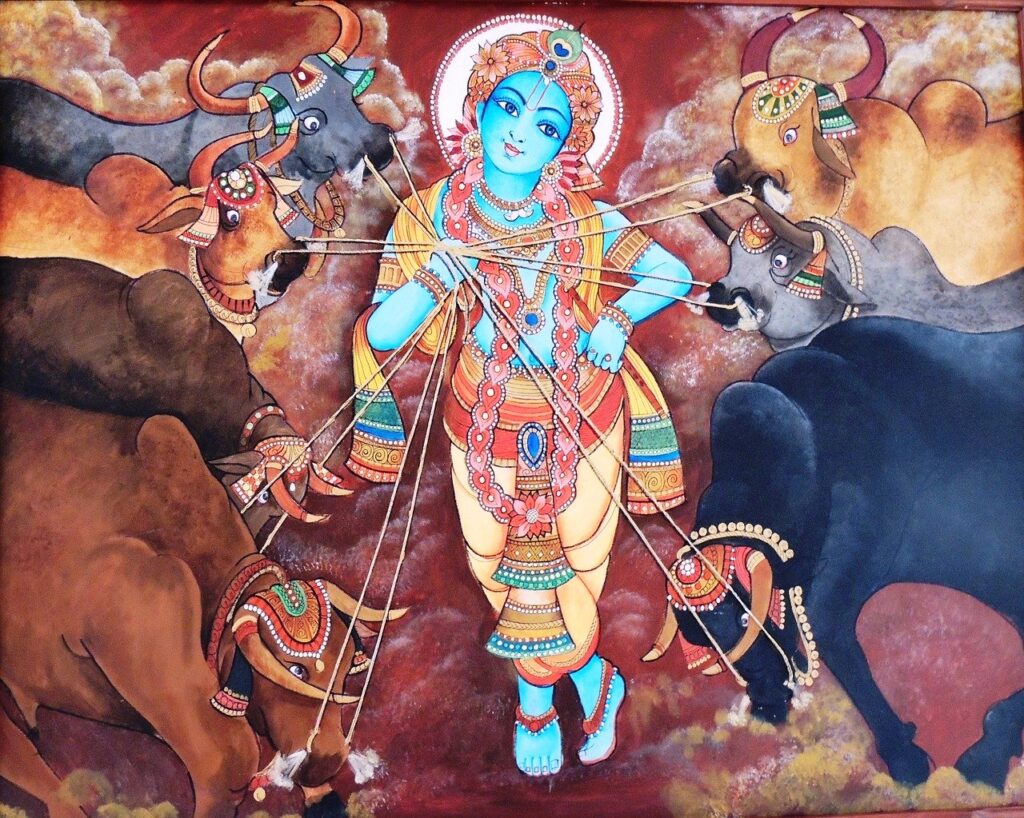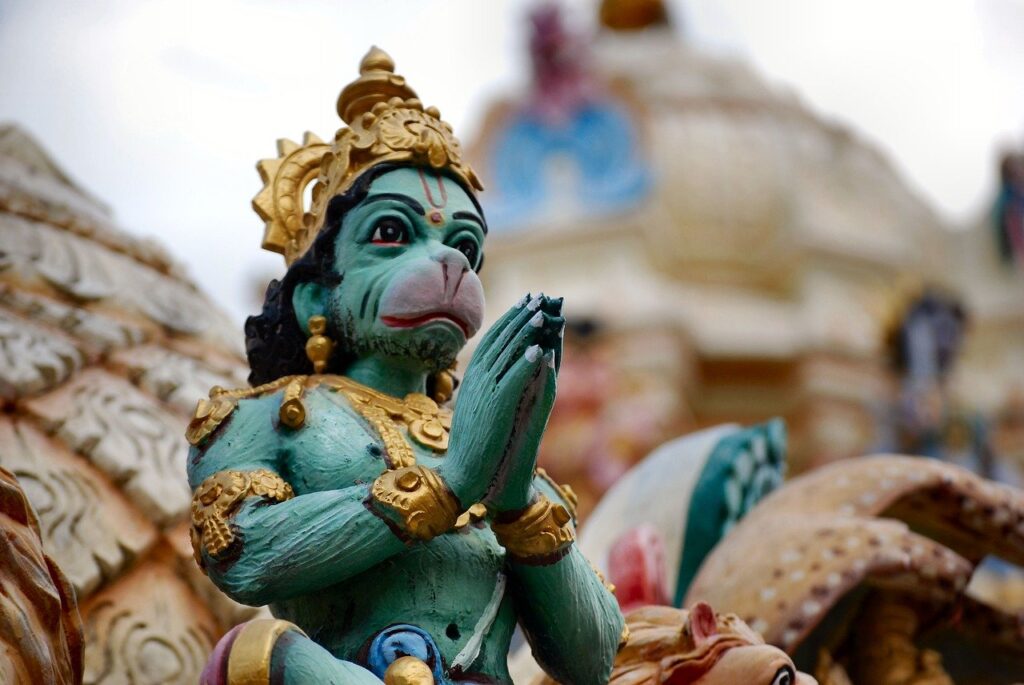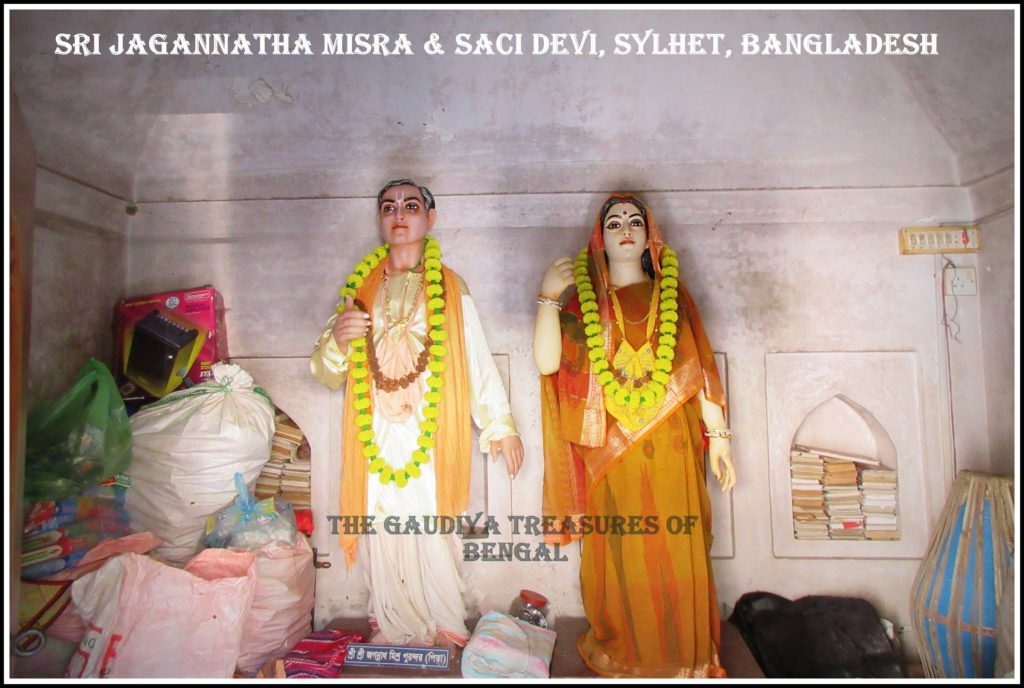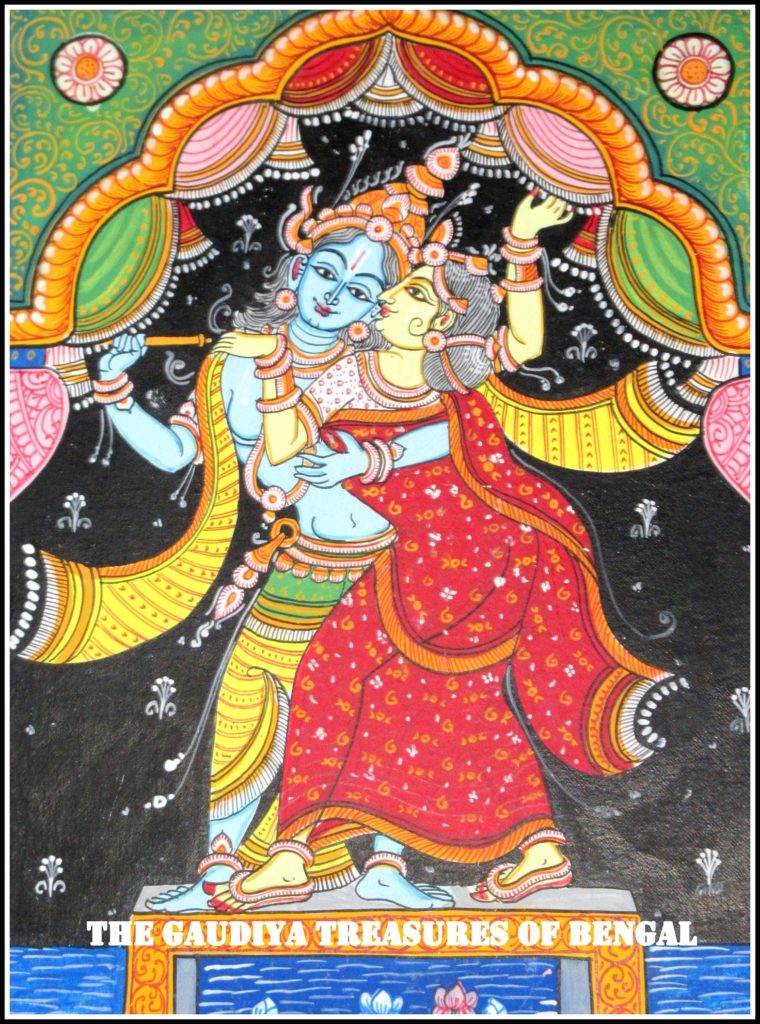#1 ‘Prema’ and ‘Kama’ – Transcendental Love vs Mundane lust
In our vocabulary, we come across two concepts – ‘Prema’ and ‘Kama’. The English equivalents for these two words are ‘transcendental love’ (divine love) and ‘mundane lust’ respectively. There is a general tendency to confuse ‘Prema’ with ‘Kama’ and vice-versa. Considering the apparent similarities between their external characteristics, such confusion is inevitable. But a little reflection will reveal the stark distinctions between the two – ‘Prema’ is divine while ‘Kama’ is hellish. Sri Chaitanya Mahaprabhu distinguishes between these two with a beautiful explanation –
atmendriya-priti-vancha – tare bali ‘kama’
krishnendriyo-priti-iccha dhare ‘prema’ nama
(Chaitanya Charitamrita, 4.165)
–
The desire to gratify one’s own senses is lust, but the desire to please the senses of Lord Krishna is love.
So wherever the desire to gratify our senses exists there is lust and wherever the desire to gratify the senses of Krishna (Supreme Lord) exists, there is love. Preachers of Divine Love have appeared at different times on this planet. The comparative study of their teachings of Divine Love reveals the differences between them. This difference is primarily due to the diverse spiritual evolution of different people. A careful comparative study of all these messages of Divine Love will establish the superiority of Lord Chaitanya above all others. Lord Chaitanya’s gift in this regard shall be determined to be the highest.
#2 Importance of realizing our relationship with the Supreme
Love, for its purity, depends upon the purity of one that loves and one that receives it. It is just like the flame of a fire, that depends upon the quality of its fuel. We are designed to love God, but to do so, we must first recognize Who God is and who we are. A vague notion of God will not help us in this regard. Such a perception is not sufficient to strike the love chords of our hearts. Some faiths depict God as an almighty emperor, ever seated on the high, and always ready to award or punish the acts of His servants. His attendants, who are always ready to obey His orders, stand in awe at a respectable distance with a feeling of great humility. Some other faiths portray the relationship between God and the living entities as one based upon the feeling of gratitude rather than the spontaneity of the heart. Such a relationship is not centered around true love but is instead represented by a high degree of indifference on the part of the servant.

Similarly, talking of who we living beings are, different faiths have proposed different theories but most of them are not able to describe the self as completely free from a material conception. For such an adulterated self, it is not at all possible to experience divine love that is completely devoid of material contamination and situated in a transcendental plane of consciousness.
#3 Attachment to Matter vs attachment to the Divine
In all major religious scriptures, it is emphasized that our clingings to the things of this world incapacitate our soul to the culture of divine love. For example, the bible states, “Love not the world, neither the things that are in the world. If any man loves the world, the love of the Father is not in him”. Elsewhere we find in the Bible, “For all that is in the world, the lust of the flesh and the lust of the eyes and the pride of life is not of the Father but is of the world. And the world passes away and the lust thereof. But he who doeth the will of God abideth forever”. So is love for this world a vicious thing? Certainly not. What Christ, along with other teachers, condemn is our attachment to material things for the sake of our own pleasure. Sensuous pleasure keeps us entangled in this material world and is the root cause of our sufferings. Whereas, in divine Love, everything is accommodated. Our every action, every occupation, performed to please the Lord, however low they may be, are divine. Hankering for Gold for its own sake is abominable but hankering for it so that one can offer it unto the Lord, is holy. The greater the affection one feels for the Lord, the lesser is one’s affinity towards the things of this world. Seeing everything in relation to the Supreme Lord, or the perception of spirit without reference to matter that veils it, is impossible if the perceiver has not already freed himself from the hold of matter. One suffering from an adulterated conception of the Lord or one’s own self can only perceive a perverted reflection of Divine Love. In such a scenario, it is not possible for divine love to fully blossom or reveal herself in her full grace and grandeur.
#4 Vedic conception of the Self
The Vedic conception of the self (jivatma) is not polluted with any kind of material contamination. The self is pure and perfect. He is all spirit and hence he can cultivate transcendental Love to its fullest. Differences in the conception of Divine Love correspond to different degrees of spiritual evolution in man. Divine Love spontaneously manifests within one and it cannot be acquired from any external source. It descends from the high according to our eligibility. We receive only that which we can hold and not what we cannot. Religious teachers are a medium through which these messages of Divine Love are communicated to us.
#5 From Trading with to Loving God – An evolution of spiritual consciousness
In the Vedas, we find that God appears to us as the giver of light in the form of Sun; He appears as Indra as the giver of rains; as the God of success in the form of Ganesh; as the goddess of fortune in the form of Lakshmi and so on. Worship of God as the supplier of our needs practically amounts to the worship of the gifts that He bestows upon us. In all of these cases, affinity to God has been actuated more by what He gives than by His own self. But such a kind of relationship where one worships the Lord for the fulfillment of or for gaining a selfish end, is not divine love but a trade. In other words, it is lust. And lust hinders the cultivation of Divine Love.
Lord Chaitanya teaches us that higher than such a relationship is one where God appears to us as the object of our heartfelt devotion. All demigods and demi-goddesses, wielding different powers, are now seen in relation to Him and simply perceived as His agents. Such a divine Love felt for the Supreme Lord can be broadly classified into five grades. Love manifested in each of these grades has a specialty of its own which distinguishes Love in one stage from that of the other. These five grades of Love are Shanta, Dasya, Sakhya, Vatsalya, and Madhurya. In two and a half of these ‘Rasas’ (mellows) or grades, God is worshiped as Lord Narayana. And in the remaining two and a half of the Rasas or grades, God is worshiped as Lord Krishna. The plane of spiritual consciousness in which the cultivation of Love for Narayana is possible is known as Vaikuntha while the other in which the same for Krishna is possible is known as Goloka. Hence these two categories of worship can be classified as Narayana Pujan (worship of Narayana) and Krishna bhajan (worship of Krishna). It must be noted that Lord Krishna and Narayana are the same person exhibiting different moods. The transcendental realm of Goloka is considered superior to that of Vaikuntha for reasons discussed below.

Lord Narayana manifests a majestic form possessing four hands carrying Sankha (conch serving the purpose of a trumpet), Chakra (disc), Gada (club), and Padma (lotus flower) respectively. He wields all attributes of divinity such as subtlety, power, control, omniscience, etc. To such a manifestation of the Supreme, a devotee can only approach with great humility. His servants stand at a respectable distance to obey His behests and most gratefully receive what He is pleased to confer upon them.
Lord Krishna on the other hand possesses a two-handed transcendental form characterized by exquisite beauty. He is an ever-smiling playful cowherd boy, who wears a crown of wildflowers around His neck. With one hand He carries a flute and with the other, He carries a stick. The majestic feature of the Supreme is now fully eclipsed by His juvenile suavity. Nothing is awe-inspiring about Him now that would impede spontaneity in the affection of His devotees for Him.
Evolution of Divine Love : Understanding the Five Rasas (devotional mellows) – Shanta, Dasya, Sakhya, Vatsalya and Madhurya
#6 Shanta Rasa (Neutral state of Love)
This Mellow of divine love (Rasa) falls within the purview of Narayana pujan (worship of Lord Narayana). This is a neutral state in which the devotee neither feels any affection for his worshipable Lord Narayana nor does he have any attachment towards the world. He offers the Lord his love in a manner sanctioned by the scriptures. The indifference of the servant towards his Lord is the chief characteristic of this stage. Sages like Sanaka, Sanatana are devotees in Shanta Rasa.
#7 Dasya Rasa (approaching the Lord as His servant)
This Rasa or Mellow of divine love also falls within the purview of Narayana pujan (worship of Lord Narayana). A devotee in Dasya Rasa approaches the Supreme Lord as His servant. He prostrates himself before Him and is ever ready to carry out His instructions with a degree of affection. Affinity towards God now manifests itself in the form of affection. The beginning of affection marks this stage of love. Garuda and Hanuman’s worship falls within this category.

#8 Sakhya Rasa (approaching the Lord as a friend)
Sakhya Rasa is the stage of divine Love where a devotee approaches the Supreme Lord as a friend. This stage can be further divided into two – Gaurab Sakhya Rasa and Visrambha Sakhya Rasa. Gaurab Sakhya Rasa falls within the purview of Narayana Pujan in which a devotee approaches God as his friend with a feeling of respect. Arjuna is a devotee in Gaurab Sakhya Rasa.
Love in the stage of Visrambha Sakhya Rasa, on the other hand, marks the beginning of Krishna Bhajan (worship of Lord Krishna). The devotees in this stage approach God as His beloved friend. They no longer approach the Lord with reverence and treat Him as an equal. Krishna, the Supreme Lord, now plays with them and eats with them. The devotee can no longer remain without the association of the Supreme Lord. We read of pastimes in Srimad Bhagavatam, where a devotee in Visrambha Sakhya Rasa, on winning a game, is carried by Krishna on His shoulders. Again When Krishna wins a game, the devotee gets a chance to carry the Lord upon his shoulders. Sridama and Sudama represent this class of devotees.
#9 Vatsalya Rasa (approaching the Lord as His parents)
Vatsalya Rasa falls within the purview of Krishna bhajan. In this stage, Krishna, the Supreme Lord, is worshiped as one’s own son. The Lord now receives parental love and care from the concerned devotee. The Supreme Lord, now a restless playful child, demands constant care and attention from His parents who must now be tending to His wants. They should feed Him, dress Him, administer Him medicines when ill, put Him to sleep, and then watch Him over when asleep. The mind of devotees in Vatsalya Rasa is wholly occupied with thoughts for their beloved Lord whom they perceive as their child. They apprehend danger for Him where there is none and think of Him to be lost when He goes out of their sight even for a moment. They rebuke Him and threaten Him when they find Him doing anything wrong. They take Him onto their lap and caress Him lest their child becomes too frightened. Hence these devotees in Vatsalya Rasa claim a superior position than the Lord Himself. The services of Nanda Maharaj and mother Yashoda fall within this category.

#10 Madhurya Rasa
Madhurya Rasa falls within the purview of Krishna Bhajan and constitutes the highest grade of divine Love. It is where a devotee approaches God as His consort. This is unlike the so-called love of this material world where one primarily concerns himself with his/her sensuous pleasures. The distance between the servant and the Lord which was distinctly visible in the cases of Shanta and Dasya Rasas, indistinctly visible in the case of Sakhya and Vatsalya Rasas, is now completely absent in Madhurya. The servant and the Lord are now united as never before. The servant serves her lord with everything. She lives for her Lord and dies for Him. There is nothing that she cannot do to make Him happy. His pain and grief become her own. Now, the servant cannot enjoy anything which does not make her Lord happy. She takes pleasure in putting on an ornament if it pleases her Lord. She even gladly welcomes death if it be a service unto Him. Such is the selflessness of love manifested in Madhurya. Srimati Radharani and the other Gopis of Vrindavana represent devotees in this category.
Divine Love cannot be realized here in the relationships of this material world. The love of this world is a perverted reflection of divine love. We love our son not as much for his sake as for the sake of our own. In the same manner, the conjugal love of a wife is not free from the expectation of satisfying her own senses. In every display of love, both parties have the reason for their own senses being gratified. Love not directed towards the Supreme, can never be completely selfless.

When Krishna moved to Mathura leaving behind the Vraja-Gopis in Vrindavana, the latter became greatly overwhelmed with grief. Sri Radhika then consoled Her mournful friends saying that if the Lord took pleasure in deserting them and if that ultimately leads to their death, then they should most happily welcome it. They prefer His enjoyment to their life.
Rukmini or Radharani – Who loves Krishna more?
The Puranas narrate another pastime that establishes Gopi Prema (love of the Gopis) to be the highest principle of Divine Love. One day Narada came to Krishna and wanted to understand as to who loved Him more – Rukmini (His married wife) or Radharani. Krishna remarked that the love of Radharani was like a great ocean while the love of Rukmini, can only be compared to the water held by the hoof of a cow. Narada was utterly surprised and asked for proof. Krishna then advised Narada to approach both Radha and Rukmini and beg for the dust of their feet. He asked Narada to convey to them that Krishna was ill and could only be cured if He drank the washings of their feet. Accordingly, Narada first approached Rukmini who was aghast hearing Narada’s request, and fled to a corner in great embarrassment. She could not even imagine making her Lord drink the dust of her feet. But when Narada approached Radharani, She readily complied with his request and requested Narada to return to Krishna as fast as he could, lest some ill should befall upon Him. Krishna later explained to Narada that Rukmini looked upon the task as hellish whereas Sri Radha took it as an opportunity to serve Her beloved, not caring if She would be eternally condemned to hell for Her services. Such is the glory of Radharani’s selfless love.
Lord Chaitanya primarily preached the exalted path of divine Love as demonstrated by the Gopis of Vrindavan. Chaitanya Mahaprabhu cultured it Himself and called upon others to do the same. Lord Chaitanya’s gift in this regard must be deemed the highest to mankind. We do not know if we are yet in a position to appreciate this gift of His.
